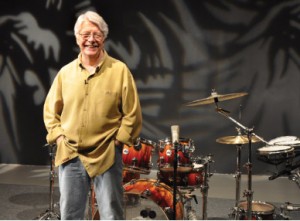 Legendary British music producer Ken Scott worked at the age of 16 in the tape library at Abbey Road Studios, and he went on to become a recording engineer for bands you might have heard of—The Beatles, The Rolling Stones, Pink Floyd, Jeff Beck, Elton John, Procol Harum and America, to name a few. As a producer, his credits include, Supertramp, Devo, Kansas, Level 42, David Bowie, The Dixie Dregs and, of course, Happy The Man’s Crafty Hands. His book “From Abbey Road to Ziggy Stardust” is coming out on June 6th, 2012 (here is the link to the book on Amazon.com and Barnes & Noble).
Legendary British music producer Ken Scott worked at the age of 16 in the tape library at Abbey Road Studios, and he went on to become a recording engineer for bands you might have heard of—The Beatles, The Rolling Stones, Pink Floyd, Jeff Beck, Elton John, Procol Harum and America, to name a few. As a producer, his credits include, Supertramp, Devo, Kansas, Level 42, David Bowie, The Dixie Dregs and, of course, Happy The Man’s Crafty Hands. His book “From Abbey Road to Ziggy Stardust” is coming out on June 6th, 2012 (here is the link to the book on Amazon.com and Barnes & Noble).
ATI: How did you get involved with Happy the Man?
KS: I was contacted by an A&R guy from Arista that I’d known when he worked at A&M. He told me about this band in Washington, and what he said interested me, so they flew me out to see them. I believe I saw them at a gig at The Cellar Door, and I loved them.
ATI: Is that the type music that you were kind of into at the time? You had worked with Supertramp, and they were basically a prog band.
KS: I’ve yet to really determine what prog rock is. My musical career has been all over the place. I have not wanted to get tied down to any particular kind of music. I get bored, and so I like to go from one type of music into something totally different. Happy the Man hit me at the right time, they certainly suited what I was looking for at that point, and I loved them musically, so it was a perfect match for me.
ATI: What, specifically, did you like about their music?
KS: It was the total thing. I go on gut instinct, and something in my gut just said “They’re good. It would work well in the studio,” and it did. It was very un-American, which I loved. Some of it was movie score-like which I enjoyed. I loved the strange time signatures; I worked with Mahavishnu Orchestra by this time, so I was into weird time signatures, which they had plenty of. It just grabbed me. I really loved their music.
They worked well together. I particularly like Mike Beck. He wasn’t your typical drummer. He came across as being someone that didn’t like to be trapped behind a drum set.
ATI: Stanley Whitaker told me you were double tracking guitars a lot; that was your method of making the sound fuller. What was your opinion of the technical complexity of the guitar parts? Did you know you were pushing the guitar player to the limits?
KS: I’m not a big fan of using session musicians. I like to get an act that, if you put a piece of music in front of them, can’t just knock it off straight away. I like musicians to struggle. I think it creates an energy and gives feeling to it. If you just play something easy, very rarely does it have any emotion; but if they’re struggling to get the part—flying by the seat of their pants is one way to describe it, then you get more feeling from it. I love the fact that I push people harder.
ATI: Stan will be interested to hear that; he’ll know what you were trying to do with him there. What did you think about his skill as a guitar player?
KS: He was good. He was good; they were all good.
ATI: What was your impression from Stan’s vocals?
KS: It felt forced–almost like, “Okay, we know we’re not going to sell purely instrumental, so let’s throw in a couple of vocals just to see if it will broaden our audience base.
There was another band that I’d worked with called the Dixie Dregs, and they were a completely instrumental band. They were on a different label, and after I finished working with them, they signed with Arista, but Arista forced them to do a least one vocal in every album from then on, so they just brought in guest singers. I don’t know if that was pushed on the band by Arista or not, but there was almost that feeling to it for me.
ATI: For the record, I can tell you it was one of the conditions of signing. So Stan said, “Well, if nobody wants to sing, then I will. I sang in the choir at school.” Did you ever get any feedback from other musicians, producers, about the work you’ve done with Happy the Man?
KS: At that time, no. There has been more over the years. [HTM] got lost in the shuffle but, over the years, they’ve managed to come to the top. I think more people know of Happy the Man now than did back then. There are web sites I go to where people will mention that they’ve just discovered Happy the Man, aren’t they amazing and lots of people will join in.
Speak Your Mind
You must be logged in to post a comment.